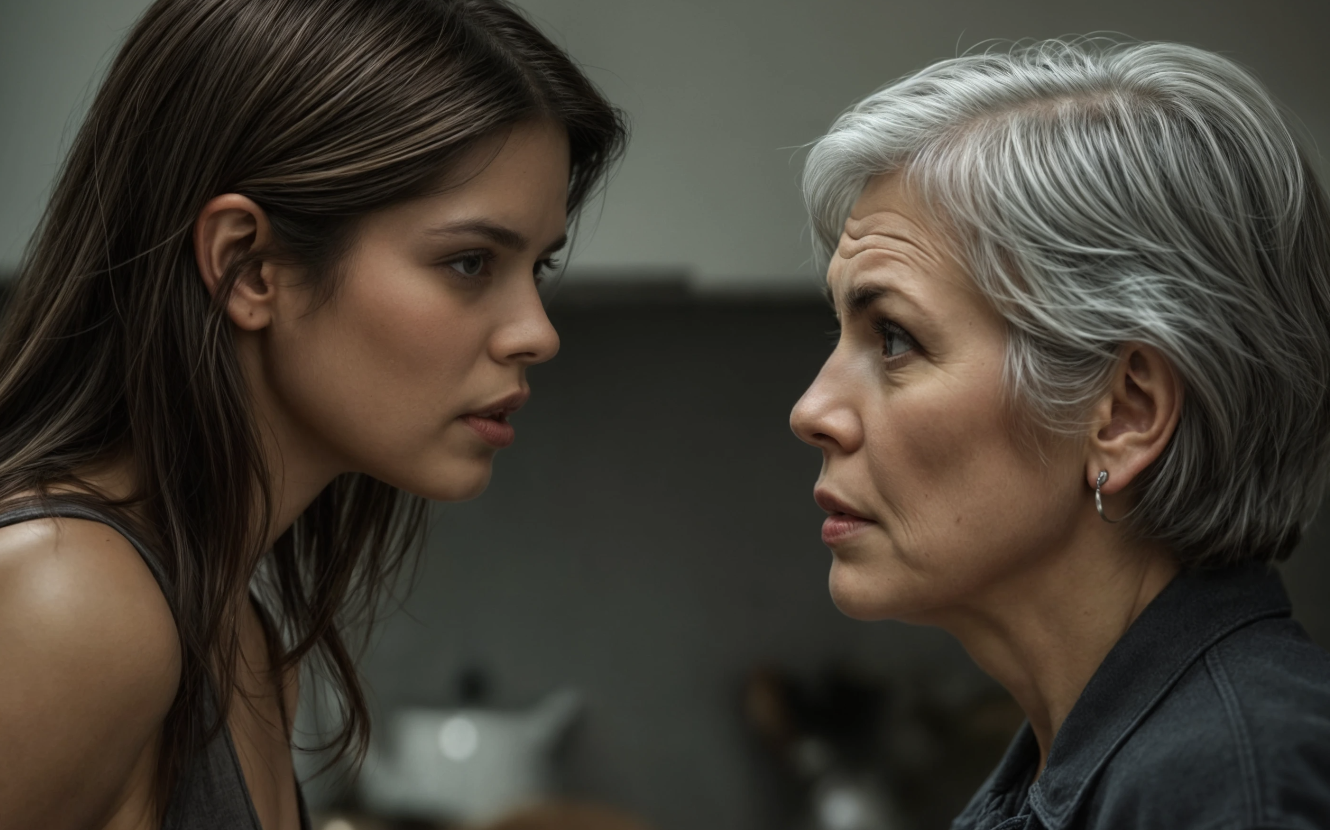Mashenka, open up, it’s me! I brought fresh little pies, with cabbage, just the way Pavlik likes them!”
The voice behind the door was brisk and insistent, leaving not the slightest chance to pretend no one was home. Maria slowly wiped her hands on the kitchen towel and shot a brief, heavy look at her husband. Pavel was sitting at the table, staring into his cooling cup of coffee, looking every inch the suffering genius plunged into the depths of an existential crisis. He didn’t react to his mother’s visit at all, as if the doorbell were just another part of the intrusive, imperfect outside world.
Unlocking the door, Maria stretched something resembling a polite smile across her face. On the threshold stood Raisa Grigoryevna—a massive woman in a sturdy coat, with a sharp, heavy gaze and a bag exuding a suffocatingly-homely smell of fried dough. She didn’t so much enter as glide into the hallway, bringing with her an aura of unquestionable righteousness.
“Hello, Mashenka. Why are you so pale? Feeling unwell?” she asked, taking off her coat and sweeping the apartment with a hawk-like look. “Where’s Pavlusha? In the kitchen? Well, I knew it.”
Without waiting to be invited, Raisa Grigoryevna headed straight for the kitchen. Her arrival immediately disturbed the sterile order Maria valued so much. The kitchen, with its smooth steel surfaces and minimalist design, seemed an ill-suited stage for this display of maternal care. Pavel finally tore his gaze away from his cup and gave his mother a weak nod, forcing something like a smile.
“Hi, Mom. Why so early?”
“For a mother, it’s never too early, son,” declared Raisa Grigoryevna, setting the bag of pies on the table like a battle standard. “I saw you’d lost weight, gone all drawn. So I brought you something to build you up. Eat while they’re still hot.”
Maria silently put the kettle on. She moved smoothly, almost noiselessly, but every gesture radiated enormous inner tension. She felt like an actress in a long-since tiresome play where all the lines were known in advance. Now would come the prelude: talk about the weather, distant relatives’ health, market prices. And then, once the soil was well fertilized with this everyday chaff, Raisa Grigoryevna would move on to the main point.
“It’s always so clean here, Masha. Sterile, even,” the mother-in-law remarked, sliding a finger along the countertop and, satisfied, not finding any dust. “Only it’s a bit short on coziness. A man needs warmth, especially when he’s going through such a difficult period.”
Maria set a cup in front of her.
“Tea? Black or green?”
“Black, as usual. Pavlik, at least have a pie. They’re still hot. You’re just sitting there with no appetite, it hurts to look at you,” Raisa Grigoryevna lovingly pushed the plate toward her son.
Pavel let out a theatrical sigh, took a pie, but didn’t hurry to bite into it. He turned it in his hands as if it were some philosophical artifact and not just a piece of dough with cabbage.
“Not in the mood for pies right now, Mom. Thoughts.”
That was the code word. The signal. Maria felt how her mother-in-law instantly pulled herself together, focused all her attention and prepared to attack. Raisa turned to Maria, her face assuming a sorrowfully understanding expression, worn smooth by years of practice.
“You see, Mashenka. The man is all inside himself, searching. A creative soul can’t just go clock in and out like everyone else. He needs time to rethink, to find a new path. And in moments like this, support from a loved one is more important than ever. A woman’s wisdom, that’s exactly what it’s about—offering your shoulder when a man is struggling. To understand, to accept…”
She spoke quietly, insinuatingly, wrapping her words around them like a warm but suffocating blanket. Pavel listened with a martyr’s expression, silently agreeing with every word. Maria poured boiling water into the cups, and the light steam rising above the porcelain seemed like the only living and honest thing in that kitchen. She waited until Raisa paused to catch her breath, then looked her straight in the eyes. The pause dragged on. The mother-in-law realized persuasion wasn’t working, and steel crept into her voice.
“Mashenka, it’s a hard time for Pavlusha, he’s searching, you have to support him, be understanding…”
That phrase, spoken in a soft, coaxing tone, was the click of a cocked trigger. Maria very deliberately set the kettle down on the trivet. The plastic hitting the stand sounded in the kitchen’s silence as dry and sharp as a shot. She turned slowly, and there was no trace of a hospitable smile left on her face. Her gaze, direct and cold, was fixed on her mother-in-law. Pavel instinctively hunched his shoulders, feeling the atmosphere change.
“Raisa Grigoryevna, let’s drop the ‘Mashenkas,’” Maria’s voice was level, devoid of any emotion—and that made it even more menacing. “Your son is a forty-year-old man, not a lost puppy that needs to be taken in and warmed. I’ve already explained everything perfectly clearly to him, without your hints and sighs. Either tomorrow he goes to any job interview—any at all, loader, courier, whatever—or he packs his things and goes to look for himself at your place.”
The mask of sorrowful sympathy slid off Raisa’s face, revealing a hard, displeased expression. She straightened up in her chair, her figure taking on a monumental quality.
“How dare you…”
“Exactly like that,” Maria cut her off without raising her voice. She stepped up to the table and rested her fingertips on it. “You’re the one who raised him like this—so you can be the one to ‘understand his situation.’ I married a man, a partner, not a venture project that demands constant, non-refundable investments. There is, unfortunately, no room left around my neck for ballast.”
The word “ballast” hung in the air. Pavel flinched as if he’d been struck and finally found his voice.
“Masha, how can you say that… in front of Mom…”
But neither woman so much as glanced at him. They had locked horns, and his pitiful mumbling was nothing more than background noise.
“I always knew you had no heart,” hissed Raisa, her eyes narrowing. “Only a calculator in your head. Money, money, money… And what about the soul? Do you even understand what creative burnout is? It’s not laziness! It’s when a person has given all of himself to his work and now needs to recover, to be filled again! And you with your interviews! You want a genius to deliver pizza?”
Maria laughed shortly and soundlessly. That laugh was more frightening than a scream.
“A genius? Come on, Raisa Grigoryevna, don’t make me laugh. Your son doesn’t have a delicate soul, he has a thick layer of infantilism that you’ve lovingly fertilized for all forty years of his life. You’ve been running after him with pies since childhood, blowing specks of dust off him and telling him how special and misunderstood he is. So he grew up absolutely convinced of his own exceptional nature—only there’s nothing he can do to prove it, except sigh deeply over cold coffee. His ‘burnout’ occurred on the exact day he was asked to take responsibility for something.”
Every word was a precise, calculated blow. Maria wasn’t accusing, she was stating facts—and that cold statement was more humiliating than any hysterics. She was passing judgment not only on Pavel, but on the entire parenting system of Raisa Grigoryevna.
“My son is a gifted man!” Raisa slammed her palm on the table, making the cups jump. “And you’re a callous, money-grubbing shrew who can’t appreciate his talent! All you care about is him bringing money into the house; what’s going on in his soul means nothing to you!”
“Exactly,” Maria agreed calmly. “I don’t care what’s going on in the soul of a man who’s been lying on the couch for two weeks while his wife works to pay for the apartment he lies around in. So spare me the speeches about womanly wisdom. You’ve already applied your wisdom—and we can all see the result sitting at my table, unable to utter even a word in his own defense. I’m done. Finish your tea and take your seeker with you. He’ll need help packing his suitcase.”
Maria’s words about the suitcase fell onto the kitchen table like drops of acid, instantly eating through the thin film of family decorum. Pavel, who until that moment had seemed like a pale shadow, a limp appendage to his mother, suddenly straightened. He slowly rose from his chair, and there was something theatrical, rehearsed, in that movement. He pushed the untouched pie away from himself, as if renouncing his last tie to the world of primitive needs, and looked at Maria. Not like a husband at his wife, but like a prophet at a misguided, narrow-minded flock.
“You never understood,” he began quietly, but with a deep, vibrating pathos in his voice. “You kept trying to squeeze me into your paradigm. Job—salary—vacation. A primitive cycle of biological existence. You only see the surface, Masha, the wrapping. And I’m talking about the essence, the very essence!”
Raisa immediately seized the banner. She looked at her son with pride, then turned a triumphant gaze on Maria.
“Hear that? Do you hear how he speaks? Did you understand a single word he just said? He’s suffocating in your little world, suffocating!”
But Pavel silenced her with a gesture. This was his big moment.
“I didn’t just ‘quit,’ like you crudely put it,” he said, taking a step forward, slipping into the role of lecturer. “I stepped out of a system that grinds down your personality, turns a person into a function, a cog. I’m not looking for a ‘job.’ I’m looking for my calling. And that, my dear, is something entirely different. It takes time, immersion, concentration. It’s inner work, spiritual labor, which is far more difficult than shuffling papers in an office from nine to six.”
He spoke, intoxicated by the sound of his own voice, by his elegant, empty phrases. He painted himself as a misunderstood titan of thought, forced to explain the laws of the universe to a savage who’s only just learned to make fire.
“And what exactly have you accomplished in these two weeks of spiritual labor, Pavel?” Maria asked with an icy calm that infuriated him far more than shouting ever could. “Discovered a new law of thermodynamics while lying on the couch? Or attained zen while binge-watching shows?”
“There! There it is!” He thrust a finger toward the ceiling. “That’s you in a nutshell! You’re trying to measure spiritual capital in material units. You can’t grasp what burnout is when it’s the soul that’s exhausted, not the body! I gave that corporation my best years, all my energy, and in return I got nothing but emptiness. And instead of helping me fill up again, you demand that I go back into that slavery! For what? For a new phone model? For a trip to the seaside where people like you take pictures of their food?”
“Exactly! For that!” echoed Raisa, pouring all her maternal fury into those words. “She doesn’t understand that you’re a high-flying person, son! She doesn’t want an eagle, she wants a draft horse to pull her cart!”
Maria listened to this well-rehearsed duet, this hymn to self-justification and infantilism, and felt something dark and cold boiling up inside her. She looked at this forty-year-old man with the blazing eyes of a preacher, at his mother gazing at her offspring in reverent awe, and the picture finally came together. This wasn’t an argument or a family quarrel. It was a collision with an entire universe built on lies, egoism and a pathological inability to take responsibility. She was done playing their game. She straightened to her full height, and her calm snapped like an over-tightened string.
“Tell me, Raisa Grigoryevna, what makes you think I’m supposed to support your son? He’s my husband, he’s a grown man—it’s his job to support me, not the other way around! So you and your ‘defense’ of your darling boy can get the hell out of here!”
That phrase, thrown into her mother-in-law’s face with open, undisguised fury, blew up the kitchen. For a few seconds, an absolute emptiness reigned, in which even the dust motes in the sunbeam seemed to freeze. Pavel sat there with his mouth open, his prophet’s pose instantly deflating into the awkward slump of a bewildered teenager. Raisa turned crimson, the air rushed noisily out of her lungs. She wanted to say something, to scream something back, but Maria didn’t give her the chance.
She no longer argued. She no longer tried to prove anything. Something irreversible had happened inside her, as if a fuse responsible for patience, politeness and hope had burned out. Without another word, she turned and left the kitchen. Her steps were firm and measured. No haste, no fuss. Pavel and Raisa exchanged glances. Confusion and a vague anxiety mingled in their eyes.
A minute later Maria returned. In her hands she held a large dark blue suitcase on wheels—the same one they had once taken on their honeymoon. She silently set it down in the middle of the kitchen with a dull thud, right between the table and the stunned pair. Then, without looking at them, she clicked open the latches and jerked the lid up. The empty, gaping interior of the suitcase looked like a symbol, an unambiguous statement.
“Masha… what are you doing?” Pavel finally managed to croak, finding his voice at last. But she didn’t hear him. She walked over to the tall wardrobe by the wall, where his outerwear hung. The first thing into the suitcase was the expensive cashmere coat she’d given him for his last birthday.
“This is for finding yourself in cold realities,” she said in a flat, metallic voice, not even glancing at the garment. “It’s much easier to focus on higher matters when you’re not freezing.”
Then she opened a drawer in the chest and took out a stack of his perfectly ironed shirts. One after another they flew into the suitcase, crumpled, tossed carelessly.
“And these—these are for interviews. For the role of genius, messiah, spiritual guru. Granted, those positions don’t usually have a dress code, but let them stay. For gravitas.”
Pavel watched this ritual with horror. It wasn’t just packing. It was a public execution, the methodical destruction of his image, his legend. She took each thing, each fragment of their past life, and stripped it of every meaning but one—practical use.
“Stop! Masha, stop it right now!” He tried to grab her hand, but she pulled away with such disgust you’d think he was something filthy.
She went over to the shelf where his books stood—all those little volumes on self-development, philosophy and finding one’s calling. She swept them into her arms and dumped them on top of the shirts.
“And this is spiritual food. You’ll need a lot of it on the road. Much more than ordinary food. Because as we’ve established, someone else is supposed to provide the ordinary kind.”
Raisa, having recovered from the first shock, lunged at her.
“You’ve gone mad! Those are his things!”
“They were his. Now it’s your baggage,” Maria cut her off without turning around. She took his laptop and laid it carefully in the special compartment. “A tool for searching for a calling. Or for watching series. Depends on the degree of enlightenment.”
The last to go in were his shoes, thrown with a dull thud as if they were stones. She slammed the lid shut with force, snapped the locks. Then she pulled up the handle and rolled the suitcase with a clatter right up to Raisa’s feet. It stopped a centimeter from her boots.
Maria straightened and gave them both a long, heavy look. There was no pain or regret in her eyes now—only cold, scorched emptiness. She looked straight into her mother-in-law’s eyes.
“You said your son is gifted. Take your gift back. I’m full. File a return with the manufacturer.”
With that, she turned and left the kitchen without looking back. They were left alone: the bewildered “genius,” his mother, purple with rage and humiliation, and the suitcase standing between them like a tombstone on the grave of their ruined family life. A total, deafening silence fell over the apartment—a silence their shared domestic life would never disturb again…



